What is a Comprehensive Eye Examination?
When you see your optometrist you are taking a very important step towards ensuring a lifetime of clear and comfortable vision.
Your optometrist is a primary care health practitioner regulated by the government under the Health Practitioners Competence Assurance Act. Only a registered optometrist may use the title of optometrist and prescribe glasses or contact lenses. Your optometrist is also able to prescribe or sell a range of medicines for treating eye diseases including infections and allergies.
Your optometrist will need to examine your eyes before deciding the next step because it is necessary to make a diagnosis before commencing treatment of your eye condition. For some eye diseases, treatment with a medicine is necessary and sometimes a person with eye disease will be referred for surgical treatment.
If your eye condition can be assisted by corrective lenses, your optometrist can prescribe an appropriate correction.
It is important to understand that without a proper diagnosis, a number of sight-threatening conditions will develop unchecked. Without treatment these disorders can progressively destroy your sight and blindness can result.
When you first consult an optometrist you should expect to have a comprehensive eye examination. This will take time as there is a lot to cover.
Key Elements of the Process:
- Questions about your medical history
- An assessment of your internal eye health , including retina, optic disc, and blood vessels
- A Slit-lamp assessment of your external eye including lids and lashes
- An assessment of your colour perception as some general diseases affect colour vision
- Examination to assess glaucoma including a measure of the pressure in each eye
- An assessment of visual functions including any refractive error
- Tests of your eye muscles to check they move and coordinate properly
- Visual fields test to check for blind spots caused by eye disease or brain damage (e.g. glaucoma or stroke)
- An assessment of pupils function and response
- Discussion of the diagnosis
- Discussion of the management options and plan for treatment
- Recording all of above in your clinical record
As your optometrist is a health professional you should expect to be asked about your age, general health questions, and questions about your family history of diseases such as glaucoma, diabetes and heart disease.
Sometimes, in order to see all of the inside of your eye and to get a good view right to the back of it your optometrist will need to dilate your pupil.
Dilation involves using eye drops to make the pupil bigger (completely painless) and it takes some time for the drops to work.
After dilation your close-up vision may remain blurred for several hours as the pupil slowly goes back to its normal size. You may be more sensitive to light while the pupil is dilated but the process is painless and does no damage to your eyes.
For some conditions optometrists will recommend treatment with medicines that you can buy from the practice or the pharmacy. Many optometrists will also be able to prescribe eye medicines just as your GP does and they might also order lab tests if an infection is present. This means you should expect to be asked about any medicines you are taking, even if they are not for your eyes.
If you need spectacles or contact lenses then you can ask your optometrist to prescribe an appropriate correction. Prescription findings at examination will be derived using both the direct measurements made by your optometrist in the examination and the information you provide when answering questions such as ‘which is better, 1 or 2’ and ‘which is brighter, red or green’. This is because vision is a very complex human sense that involves both the eyes and the brain working together to interpret what we see.
The complexity of vision is most apparent when the prescription findings at examination specify an accurate correction and yet you may not feel comfortable when using the new lenses. This phenomenon is caused by failure to adapt and can be overcome by making small adjustments to the correction. Your optometrist will record information about your final preferred correction to update your prescription findings. This becomes your dispensed prescription.
Optometrists in New Zealand are qualified and equipped to provide a comprehensive range of primary eye care services:
- Refractive testing and comprehensive vision examinations
- Prescription of glasses or contact lenses
- Assessment, management and referrals of ocular emergencies
- Assessment and treatment of vision problems in children
- Co-management and primary care monitoring of patients with ongoing eye conditions
- Primary eye care for management of patients with diabetes, including dilated fundus examination
- Visual acuity testing, slit lamp examination, visual fields testing
- Removal of embedded corneal foreign bodies
- Assessment and reporting for fitness to drive; credentialed optometrists are also able to undertake examinations for aviation licensing on behalf of CAA
Therapeutically-endorsed optometrists are qualified and equipped to:
- Examine, treat or refer patients with ocular disease, superficial infection and anterior eye disease
- Triage and treat or facilitate management of 'red eye'
- Triage and manage ocular emergencies and embedded corneal foreign bodies
- Provide primary care and prescription treatment for conditions such as dry eye and allergy
- Assess/monitor and treat glaucoma in conjunction with ophthalmologists
- Provide after-care for cataract and refractive surgery
- Assess and treat infections or complications arising from contact lens use

